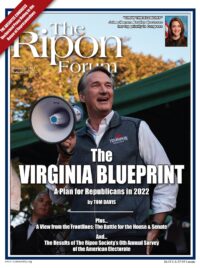
Republicans have the winds at our back in the quest to take back the Senate majority in 2022 and are well positioned to gain the one seat needed to do so, if not many more.
Consider the confluence of events brewing in our favor.
First, President Joe Biden’s approval rating is hovering at a dreary 42 percent, according to the Real Clear Politics average. A recent Washington Post/ABC survey showed the GOP with an historic 10-point lead on the generic congressional ballot. The Democrats’ marquee legislative priority, a multi trillion-dollar smorgasbord of government spending despised by suburban voters, remains caught in the morass of Capitol Hill. Inflation is the worst it has been in three decades.
Second, look at history. Since the Civil War, the president’s party has lost ground in the Senate in 24 of 40 elections, with an average loss of roughly 2.5 seats per cycle, according to the UVA Center for Politics. Looking at more recent history, things only get worse for Democrats. In the post-World War II era, the party in power loses 3.5 Senate seats on average, with the president’s party losing ground in 13 of 19 mid-terms.
Despite all that we have going for us, the last thing Republicans can do is rest on our laurels.
Third, look at fundraising. The NRSC is crushing it — shattering records and outpacing the DSCC every month while investing massive sums into an already incredibly successful digital program that will no doubt pay dividends next fall.
And finally, look at the Democrats. They are doing everything in their power to squander their Senate majority. Their top legislative priority, Biden’s so-called “Build Back Better” spending bill, is chock full of special interest giveaways and kickbacks — not to mention tax cuts for blue state millionaires and billionaires, tax increases on the middle class to pay for more IRS agents who will spy on bank accounts, outsourcing innovation and manufacturing to China, and regulating religious child care and pre-K out of business.
Despite all that we have going for us, the last thing Republicans can do is rest on our laurels. We have been in similar situations before and fallen short of the ultimate goal.
Arizona and Georgia, arguably our two best pick-up opportunities, are represented by freshman Democrat incumbents with voting records far to the left of their states. But Mark Kelly and Raphael Warnock hauled in $100 million and $165 million respectively in the previous election cycle, and will likely raise much more in 2022. Nevada is not far behind. Adam Laxalt is a proven quantity who will run a strong campaign against a weak incumbent who barely won her first race. In New Hampshire, Maggie Hassan is arguably the weakest Democrat incumbent, and she knows it.
Republican retirements in Pennsylvania, North Carolina, Ohio, and Missouri have Democrats salivating, but fractured divisive primaries on the left stand to derail any hopes they have. Wisconsin will be a tough race no matter what Senator Ron Johnson decides to do, but, like so many other states, Democrats are locked in a divisive multi-candidate primary, as well.
If we keep our eyes on the prize, work together and remind voters of all the crazy things Democrats are doing, Republicans will cruise to the majority.
We can’t take any of our incumbent races for granted, either. Lisa Murkowski is in for a tough battle in Alaska, but if anyone wants to bet against Sen. Murkowski, I am glad to take that action any day of the week and twice on Sunday. And don’t sleep on Florida — a trending reliably red state for sure, but Val Demings is raising, and spending, a fortune already.
All of these challenges are far from insurmountable, as long as Republicans are unified and keep our attacks focused on Democrats. If we keep our eyes on the prize, work together, and remind voters of all the crazy things Democrats are doing, Republicans will cruise to the majority in the United States Senate in 2022.
Kevin McLaughlin served as the Executive Director of the National Republican Senatorial Committee (NRSC) during the 2020 cycle, and now is the president of Common Sense Leadership Fund, a non-profit organization that promotes conservative policies of individual freedom, lower taxes, and less regulation.




